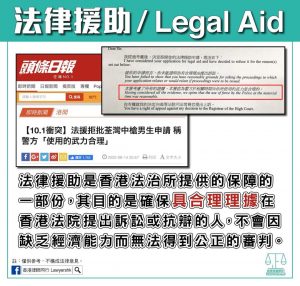Legal Aid

Legal Aid
There is recent media attention regarding a case where legal aid has been refused to the person shot by the police on 1 October 2019, to pursue a civil claim (personal injury) against the police. Does this mean that rule of law has been eroded?
What is Legal Aid?
Legal Aid is a service whereby support for legal representation by a solicitor and, if necessary, a barrister in civil or criminal proceedings is provided to eligible applicants. Legal Aid is mainly available for civil and criminal proceedings in district court and above, and for committal proceedings in magistrates’ courts. The idea is that this is part of the protection of the rule of law in Hong Kong, by ensuring that no one who qualifies for legal aid is denied access to justice because of lack of money.
Who would qualify?
Anyone, regardless of whether he or she is resident in Hong Kong or not, is eligible to apply for legal aid. Legal aid is granted if the applicant satisfies the statutory criteria for two things: (i) financial eligibility (i.e. they don’t have enough money) and (ii) merits of the case.
How to decide on the merits of the case?
The main test is whether the applicant has a reasonable claim or defence, or whether the grant of legal aid is justified. Based on information from the applicant, the Director of the Legal Aid Department must be satisfied that the case or defence has a reasonable chance of success. Apart from prospect of success, the Director needs to be satisfied that it is reasonable for the applicant to be granted legal aid. Legal aid can be refused if it is not reasonable for the applicant to be granted legal aid, and examples can include that the opposite party is uninsured with no valuable assets, or the opposite party cannot be located etc.
Why are there financial test and merit test?
Although Hong Kong is a wealthy city, it does not have unlimited resources (i.e. money). As Legal Aid is funded by the Government, this also means that this is funded by the tax payers. The financial test ensures that the support goes to those who need it the most. But even so, there is clearly a need to be careful about the use of such resources so that this is not spent on cases without merit (i.e. without probable case of success). It is therefore reasonable and expected that the granting of Legal Aid should be subject to certain qualifications.
Is there a fallback?
Legal Aid is not the only source of support for those who need legal representation. Within the private sector, there are other lawyers who may take on cases on a pro bono basis. Again, as resources are limited, these pro bono schemes tend to look at the merit of the case.







